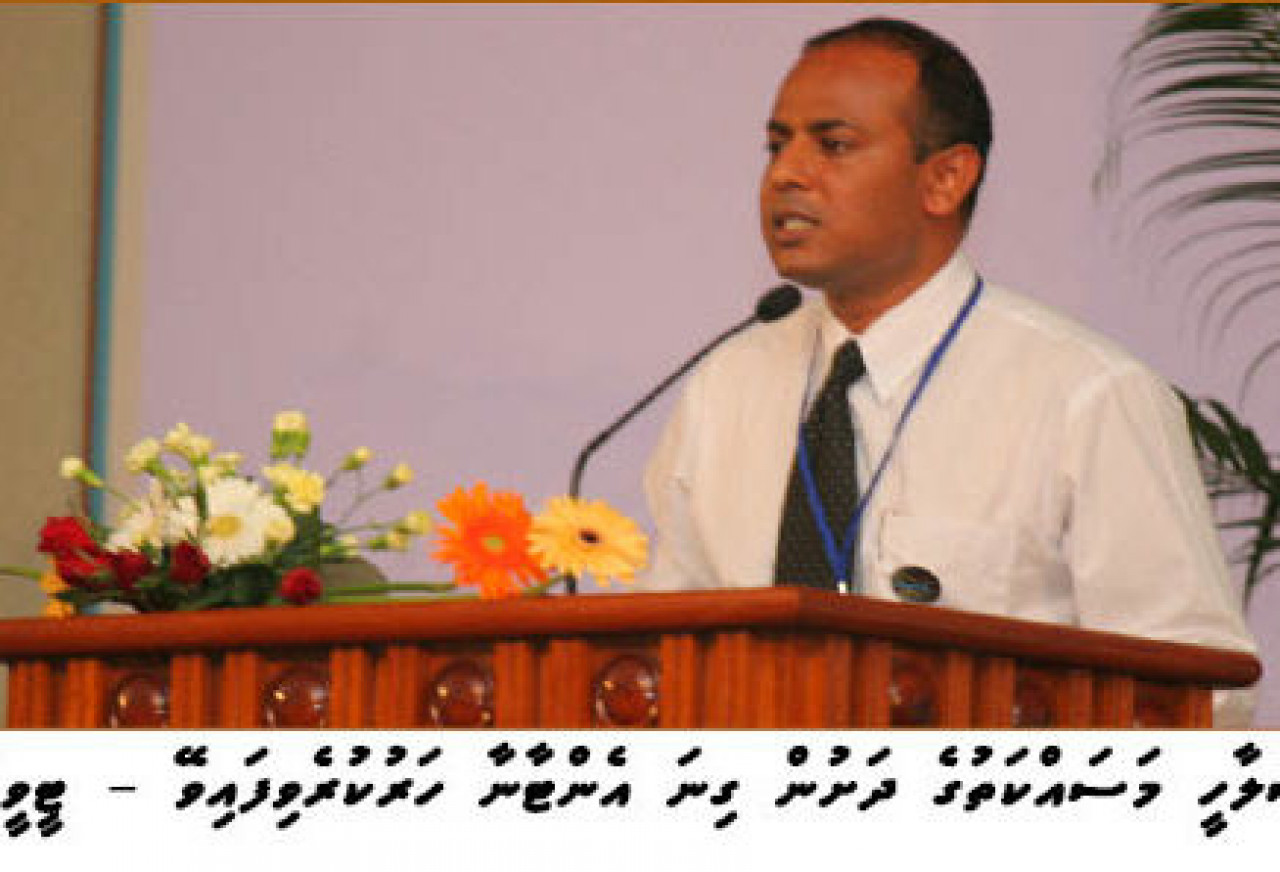STATEMENT BY
MR. ALI KHALID, CHIEF EXECUTIVE OFFICER OF TELEVISION MALDIVES,
AT THE PANEL ENTITLED ‘PUBLIC SERVICE BROADCASTING AND COMMUNITY MEDIA’
WORLD PRESS FREEDOM DAY
2-3 MAY 2007, MALDIVES
The Role of Public (State) Television in the Maldives
I congratulate Asian Media Information and Communication Centre (AMIC), UNESCO and HAVEERU daily, organizers of this unique event.
The remarkable event to mark World Press freedom day is being hosted in the Maldives while we are at a historic turning point.
The country is experiencing a process of democratization.
Recognizing that one of the key critical components of democratic governance is a free and effective media, the government has taken a host of concrete measures to enhance the freedom of press, and strengthen the country’s media as a relevant, responsible, pluralistic and persuasive force.
The government’s control on the print media has been relaxed.
Efforts to institutionalize the media and create a legal framework to facilitate a more conducive media environment are in progress.
In March the Maldives opened for private broadcasting.
The potent force of the media considered to be the ‘fourth pillar’ of democracy has been recognized in the Maldives.
Consequently, the role and power of media in spreading information in our society is gaining in strength and momentum.
I wish to pay tribute to the Minister of Information and Arts, Hon. Mohamed Nasheed, for harvesting in the Maldives, what promises to be a dynamic media sector.
My profound appreciation to AMIC, for inviting me to share my views and aspirations on Public Service Television in the Maldives.
In its pure and simplest form, public service broadcasting is broadcasting made for the public with the fundamental goal of delivering programs to citizens.
It has also been defined as ‘an information and education tool, accessible to all, and meant for all, whatever their social or economic status’.
There is no doubt; a strong public service broadcasting system is a stimulator of citizenship.
I shall not delve more into the meaning and definition of public service broadcasting, on the presumption that most of us present here have a wealth of practical understanding of PSB and its responsibilities.
Instead I’m here to tell you the special significance PSB holds for Television Maldives, the organization I represent.
In order to place my comments in context I shall give a brief overview of Television Maldives.
TVM is a State Broadcaster supported by two hundred and thirty staff, over one hundred and fifty thousand viewers, a solid terrestrial broadcasting infrastructure, a concrete, attainable vision and a strong collective will to go on.
Distinguished delegates, ladies and gentlemen,
Television Maldives, the deplored state broadcaster everyone loves to hate is in the process of morphing into a full-fledged public service broadcaster, with complete editorial independence, independent management, statutory existence and guaranteed funding.
Moving towards this goal, even as a state broadcaster we are strengthening our public service role.
We have embarked on a journey. The road stretches ahead, with obstacles and challenges.
Allow me to use this opportunity to make a commitment to our viewers.
Since its birth, TVM have contributed to the growth and development of Maldivian life and way of thinking.
TVM as a public service broadcaster would enrich the lives of the Maldivian people, through accurate and impartial news, balanced views and a variety of programs that seek to inform, educate and entertain.
Let me flag some important dimensions of our strategies to respond to the challenges of becoming a true public service broadcaster. Like Robert Frost said, ‘I have promises to keep, and miles to go before I sleep’,
One of the defining characteristics of a PSB is Universality; to put it simply, the service must be accessible to every household in that geographical area, like the universal service obligation of public services like water, electricity, and public transport.
The unique geographical make up of our country, have hampered and slowed down efforts to provide nationwide coverage to a dispersed population of about 300,000 people.
Yet the programs and content we produce reach a wider audience now than ever before.
For a better perspective, let me give you a brief overview of the technical framework of my organization.
When television broadcasting was introduced here back in 1978, we had the traditional terrestrial free to air model which covered an area of 30 km radius from Male’.
Advancing technology has since enabled us to use several alternative delivery methods including cable and satellite.
In 1998, to facilitate the viewers of the outer lying atolls, TVROs were installed at community centers in each and every inhabited island in the Maldives, making it possible for TVM signal to be received via satellite.
From 2000 TVM started installing re-transmitting stations at selected locations.
Low powered Terrestrial re-transmitting stations have been established at selected locations in each and every atoll providing service coverage for more than 80% of the total population.
At present, we are working to expand the reach to the whole country by the end of the year.
Distinguished delegates,
The information and communications technology revolution has created expectations for people to be able to access information and entertainment services in a plurality of receiving environments.
Broadcasters are now required to be present on a multiplicity of platforms bringing their content to the audiences wherever and however they find it most convenient.
At TVM there is a growing interest in web casting.
This would allow us to reclaim a large section of our audience constituting the youth, who have moved from the TV to the PC.
Besides on the competitive platform we need to keep innovating in order to survive.
As a true Public Service Broadcaster TVM would be well placed to contribute more to the process of bridging the geographical divide, of bringing the island and atoll communities closer together.
Even as a state broadcaster we’ve taken a major stride towards this goal.
Within a short span of just nine months, we’ve established an Atoll Bureau in each of the twenty atolls across the country, where journalists trained to be multi-skilled, report round the clock giving voice and visibility to all people, the poor, the industrious, the marginalized and the distant.
The aim is to develop a strategy of inclusion, participation and allow the island and atoll communities to recognize their special position in nation building and development. Quintessentially to inculcate values, attitudes and behavior that supports a healthy democratic society.
Reflecting diversity of public interest by offering different types of programs is considered an essential element of PSB.
We are doing a fair job of providing content that is local, representative of different age groups and catering to a variety of tastes and interests.
We inform and educate people with news and current affairs, with special education, factual and edutainment programming.
The dramas, mini series, and game shows not only offer wholesome entertainment; they also espouse values, teach us about culture about society, about family values and interpersonal relations.
In March this year, to offer our viewers more choice in their news consumption, we made a partnership deal with Al Jazeera English, to carry news segments of the new English language news and current affairs channel across our terrestrial network.
True Public Service Broadcasting prides itself in being a forum for public debate ensuring a plurality of opinions.
We may not have been fully successful in our quest to embrace this vital PSB element.
We launched an ongoing weekly program last year; Rayyithunge forum which translates to citizens’ or people’s forum, to encourage public discourse, and mobilize public opinion on matters of national importance.
Many aspects of the program need to be revisited, revised and improved. But the program has been widely accepted and appraised by our viewers and continues to fulfill its broader PSB objective.
Content maybe king, but quality content is the crowning glory.
In this aspect we are particularly challenged by the choices and superior program quality offered by the global broadcasters.
The proliferation of global broadcasters who are providing infotainment, edutainment and entertainment through a multiplicity of delivery channels have created an increasingly media savvy audience.
Interestingly, we have observed a new pattern in our audience expectations. No longer are we able to retain exclusive and unconditional monopoly over their loyalty.
Their loyalty and interest have shifted to particular choices of programs and the demand now is on quality content.
Even while performing the core special responsibilities of a public service broadcaster, we have to be aware of the highly competitive global broadcast environment and adapt effectively to the current trend in audience expectations.
The development of quality content and the production of niche programming is where we encounter our most profound shortcoming. TVM’s Achilles’ heel.
Lack of trained professionals equipped with the skills to locate their creative output within the stream of global media trends and technologies and create quality content.
In order for us to thrive as a public service broadcaster against this backdrop, the onus on us is to develop the human resource potential to produce content which meets the professional standards required by the industry.
This brings us to another challenge facing us vis-à-vis public service broadcasting; independence and impartiality of news and information. A necessary pre-requisite.
Let me share with you, the TVM experience.
As a State Controlled Broadcaster, I must confess that at times, when there were credible instances of threat to public order, public morality or national security we have exercised stringent editorial control.
Consequently, we are reputed of having zero tolerance for views opposing or critical of the government of using censorship and control of information; to the extent that some of the stories we’ve covered on economic and social development have been dismissed by our viewers as government propaganda.
The visual media, whether they be state, public service, private and commercial broadcasters are considered to be the most powerful creators and transmitters of images.
The reach and influence of which should be used productively, by fairly and comprehensively telling the truth, because in the end it is always the people that will count. It is a reflection of their values, perceptions, their dreams and aspirations.
In a nutshell, a true PSB has to tune in to audience expectations; there should be quality and accuracy of information, quality and diversity of different types of programming, innovation and creativity, solid professional standards, editorial independence, and social representation and relevance.
The audience no longer accepts top-down, government controlled broadcasting.
Responsive, inclusive and audience driven programming have become the common currency of broadcasting.
In conclusion, let me state a universally accepted fact: state-controlled broadcasting has no role in a democratic context and for the record, I strongly support this statement. (Members of the press please quote me on that!)
Thank you; I wish you a productive debate.



